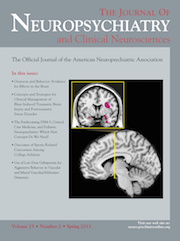Successful Use of Paliperidone in a Clozapine-Resistant Schizophrenic Patient
To the Editor: The use of paliperidone has been examined in many studies since it was first utilized in schizophrenic patients. Here, we describe a patient with clozapine-resistant schizophrenia, whose psychosis and associated depression remitted significantly after switching treatment from clozapine to paliperidone.
Case Report
“Mr. Y,” who was a 35-year-old man with a 10-year history of schizophrenia, was hospitalized because of frequent auditory hallucinations, persecutory delusions, and associated depression. He had been treated with olanzapine 20 mg daily, quetiapine 800 mg daily, and clozapine 400 mg daily, for around 1–2 months each. Sertraline 100 mg daily had also been administered concurrently with each of these medications since hospitalization. However, psychotic symptoms and associated depression continued to worsen, even though behavioral and psychosocial interventions had been utilized, as well. Therefore, paliperidone was considered with the hopes of significantly improving his symptoms.
In a 1-month period, clozapine had been gradually tapered off and then discontinued, while paliperidone had been titrated from 3 mg daily to 12 mg daily. Sertraline 100 mg daily had been used continuously. When paliperidone 9 mg daily was used, Mr. Y had fewer auditory hallucinations and feelings of being persecuted. He also felt less depressed, and could actively participate in rehabilitative activities. Adverse effects did not occur during the period of drug-switching, and his psychotic symptoms had not noticeably worsened in the 3 months since paliperidone was started.
Discussion
Clozapine has been considered probably the most effective atypical antipsychotic agent for patients with refractory schizophrenia. However, the risk of agranulocytosis, the requirement of periodic monitoring of blood neutrophil counts, and other side effects considerably decrease the drug compliance of patients. Consequently, clinicians may choose other antipsychotic agents instead of clozapine.
In contrast, paliperidone has shown clinical efficacy, safety, and tolerability in the acute and maintenance treatment of schizophrenia.1,2 Even in elderly patients and those with liver dysfunction, paliperidone is generally well tolerated.3,4 Interestingly, depressed mood is likely to be improved when paliperidone is used, and there were case reports describing patients who displayed manic symptoms after paliperidone was administered, indicating that paliperidone may have the potential to alter mood states.5
Although a single case does not firmly demonstrate that paliperidone is always effective in clozapine-resistant patients, we believe that paliperidone might be a useful medication for a certain group of schizophrenic patients who show poor response to other medications, especially when their symptoms are associated with depression. Therefore, clinicians are encouraged to use paliperidone when other antipsychotics, including clozapine, fail to improve the symptoms in schizophrenic patients.
The limitation of this case report is that we could not determine whether the improvement in depression was due to paliperidone only, paliperidone combined with sertraline, or ameliorated psychotic symptoms followed by secondary improvement of depression. In summary, for schizophrenic patients associated with depression, further studies are required to investigate whether preferable outcomes will be obtained when paliperidone is used as a monotherapy or used with other psychotropics.
1 : Paliperidone extended-release tablets for prevention of symptom recurrence in patients with schizophrenia: a randomized, double-blind, placebo-controlled study. J Clin Psychopharmacol 2007; 27:6–14Crossref, Medline, Google Scholar
2 : Efficacy and tolerability of oral paliperidone extended-release tablets in the treatment of acute schizophrenia: pooled data from three 6-week, placebo-controlled studies. J Clin Psychiatry 2008; 69:817–829Crossref, Medline, Google Scholar
3 : Safety and tolerability of oral paliperidone extended-release tablets in elderly patients with schizophrenia: a double-blind, placebo-controlled study with six-month open-label extension. Am J Geriatr Psychiatry 2008; 16:31–43Crossref, Medline, Google Scholar
4 : Remission of drug-induced hepatitis after switching from risperidone to paliperidone. Am J Psychiatry 2010; 167:351–352Crossref, Medline, Google Scholar
5 : Manic symptoms induced by paliperidone. J Clin Psychopharmacol 2010; 30:202–204Crossref, Medline, Google Scholar



